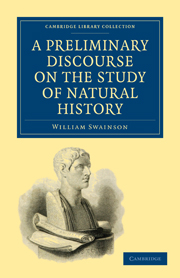Book contents
- Frontmatter
- Contents
- PART I RISE AND PROGRESS OF ZOOLOGY
- PART II ON THE GENERAL NATURE AND ADVANTAGES OF THE STUDY OF NATURAL HISTORY
- PART III OF THE PRINCIPLES ON WHICH NATURAL HISTORY RELIES FOR ITS SUCCESSFUL PROSECUTION, AND THE CONSIDERATIONS BY WHICH THE NATURAL SYSTEM MAY DE DEVELOPED
- PART IV ON THE PRESENT STATE OF ZOOLOGICAL SCIENCE IN BRITAIN, AND ON THE MEANS BEST CALCULATED FOR ITS ENCOURAGEMENT AND EXTENSION
- CHAP. I
- CHAP. II
- CHAP. III
- CHAP. IV
- APPENDIX
- INDEX
- Frontmatter
- Contents
- PART I RISE AND PROGRESS OF ZOOLOGY
- PART II ON THE GENERAL NATURE AND ADVANTAGES OF THE STUDY OF NATURAL HISTORY
- PART III OF THE PRINCIPLES ON WHICH NATURAL HISTORY RELIES FOR ITS SUCCESSFUL PROSECUTION, AND THE CONSIDERATIONS BY WHICH THE NATURAL SYSTEM MAY DE DEVELOPED
- PART IV ON THE PRESENT STATE OF ZOOLOGICAL SCIENCE IN BRITAIN, AND ON THE MEANS BEST CALCULATED FOR ITS ENCOURAGEMENT AND EXTENSION
- CHAP. I
- CHAP. II
- CHAP. III
- CHAP. IV
- APPENDIX
- INDEX
Summary
(205.) The enquiry we are now to enter upon, although to some it may appear irrelevant, is yet intimately and vitally connected with the object of this volume. We have, in the preceding pages, laid before the reader those advantages — chiefly intellectual — which might allure him to the study of nature. He may, indeed, gather recreation and delight in limiting his contemplations to the simple objects which a rural walk affords to him. He may be content to admire a few detached ornaments of the temple, without desiring to understand the extent and harmonious construction of the building itself. But, if he desire to quit this humble path of enquiry for another more elevated, if he wish to generalise his ideas, and compare his observations with those of others, he is no longer, as in the former case, dependent upon his own resources; he must associate with those of similar pursuits and studies with himself. He must learn to distinguish that which is known from that which is unknown, and this can only be done by a reciprocal communication of knowledge. Hence, the origin of all societies. The value of such associations is greater, perhaps, than at first sight it appears to be; for, besides those advantages just mentioned, there is another, without which some of the most gifted minds would probably remain inert and inactive.
- Type
- Chapter
- Information
- A Preliminary Discourse on the Study of Natural History , pp. 296 - 338Publisher: Cambridge University PressPrint publication year: 2009First published in: 1834



